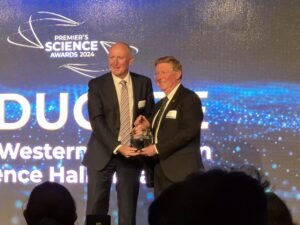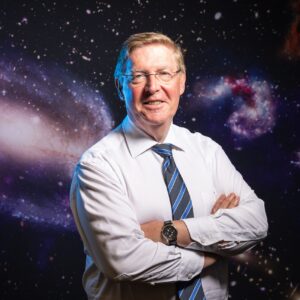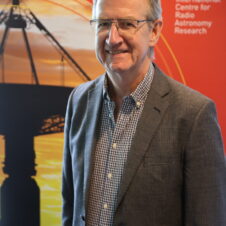ICRAR’s founding Executive Director, Professor Peter Quinn, was inducted into the WA Science Hall of Fame at the 2024 Premier’s Science Awards.
Professor Quinn led ICRAR from its founding in 2009 until 2022. He was instrumental in the selection of WA as one of two telescope sites for the Square Kilometre Array Observatory (SKAO).

Professor Quinn accepts his induction into the WA Science Hall of Fame from WA state Science Minister Stephen Dawson.
“A big thank you to all my colleagues and friends for the great honour of being inducted into the Science Hall of Fame,” Professor Quinn said at last night’s awards.
“Making discoveries, finding out the secrets of the Universe and breaking new ground, are not easy tasks. They require hard work which is never the result of one person but many. People who share a common vision and passion, who work together across a room or across the world, and who build on the work of those that came before.”
Professor Quinn spent his early research career in Australia, completing a PhD on galaxies at ANU, and the US (at Caltech and the Space Telescope Science Institute) before moving to the European Southern Observatory headquarters. There, he was Head of the Data Management and Operations Division and an early promoter of the Virtual Observatory.

Professor Peter Quinn during his tenure at ICRAR in 2019.
During his tenure at ICRAR he was named WA Scientist of the Year in the 2012 Premier’s Science Awards. He was also instrumental in establishing the international SKA Regional Centres, and the International Space Centre and Institute of Data at UWA.
In 2022, he moved to a new position in the Deputy Vice-Chancellor (Research)’s office at UWA as Executive Director of Research Initiatives in astronomy, space and data.
ICRAR’s current Executive Director, Professor Simon Ellingsen, congratulated Professor Quinn, and said the achievement reflected the importance of Quinn’s role in WA astronomy.
“This is well-deserved recognition of Peter’s outstanding and sustained contribution to astrophysics and science more broadly in Western Australia over a period of nearly 20 years,” Professor Ellingsen said.
The Western Australian Science Hall of Fame was established in 2007. It “recognises exceptional lifelong contributions to science, technology, engineering or mathematics.”

